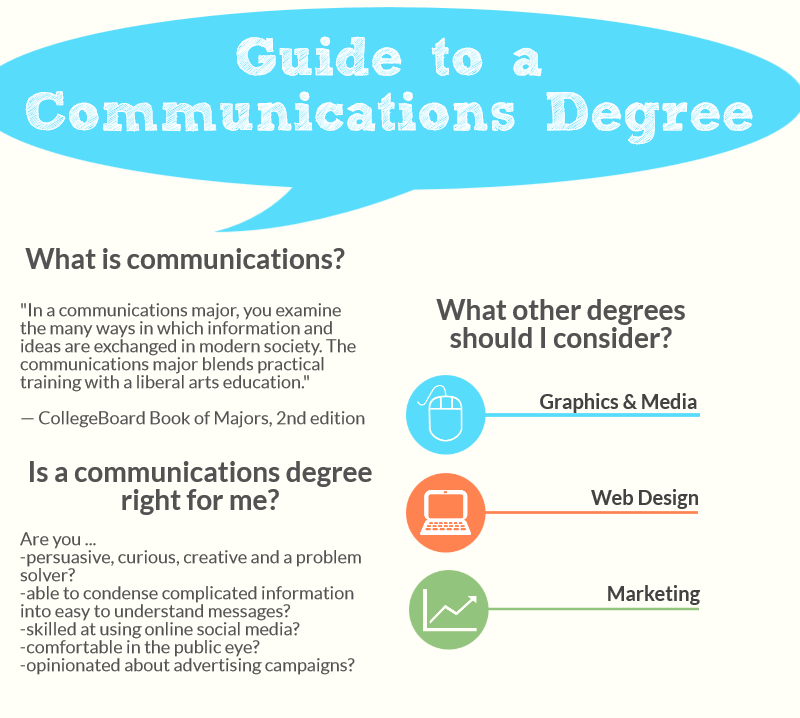.png)
Communications majors study the way information and ideas are exchanged in society. They write, edit, translate, and disseminate messaging using language skills, specialized writing techniques, print, and media outlets.
Communications professionals can be found working in almost any industry — in advertising agencies, for public relations firms, within larger organizations, for television and radio stations, publishing firms, newspapers, and beyond. If you're considering an online communications degree, you are in the right place.
ONLINE COMMUNICATIONS DEGREE INSIGHT
We asked Dr. Gayle S.O.B. how she uses her education in communications:
"Communication covers many areas including media, speaking, writing, coaching and consulting. Because of my communications degree, I can provide all of those services to my clients and the public. It is very gratifying and rewarding for everyone and continues to make my daily life a blast!"
Click To Tweet!.png)
 -- Dr. Gayle S.O.B. Spunky Old Broad
-- Dr. Gayle S.O.B. Spunky Old Broad
1. What is communications all about?
The communications field encompasses such subjects as advertising, journalism, public relations, media relations, and visual communications — all disciplines concerned with crafting and disseminating strategic, persuasive messaging via the Internet, print publications, radio, television, ambient media, outdoor advertising, and word-of-mouth to promote products, services, organizations, or concepts.
2. Is an online communications degree right for me?
Think about an online communications degree if you:
- Enjoy dealing creatively with challenges
- Work well as part of a team
- Find yourself having strong opinions about advertising campaigns you come across
- Can communicate clearly and simply
- Enjoy how businesses communicate with the public
- Have strong verbal and written communication skills
- Can condense complicated information into an easy-to-understand message
- Consider yourself to be persuasive. Do you influence others?
- Work well under pressure
- Enjoy assuming a promoting and influencing role
- Watch the Super Bowl (at least in part) for the commercials
- Can think on your feet
- Are a problem-solver
- Are naturally curious
- Are particularly skilled at using the latest online social media
- Like meeting and speaking with new people each day
- Feel comfortable in the public eye
3. What other degrees besides communications should I consider?
If an online communications degree isn't quite right for you, consider these fields instead:
Marketing
Delve into a discipline that analyzes and anticipates the needs of consumers, how new business opportunities are discovered and product development.
Business Communications
Learn to communicate effectively with your chosen audience using presentations, speeches, well crafted letters, e-mails, memos, and other interoffice communication techniques.
Graphics and Multimedia
Interested in the digital arts, Web design, or online multimedia? Sharpen skills in digital image manipulation; multimedia system design; sound, video, and animation; and more.
Online Graphics & Multimedia Degrees
Web Design
Learn how to create and use Web sites to promote, showcase, or disseminate your clients' messaging.
E-Commerce
Learn how technology and business concepts can connect by using the Internet; have a better grasp of hardware and software and how they can be applied to expand a business.
4. How can I specialize my communications degree?
Many schools allow you to choose a specialization to more finely focus your degree. These are the most common concentrations within the communications field.
Advertising
Advertising professionals create and distribute paid messaging in the form of printed materials, television and radio commercials, or Internet advertisements to persuade people to buy products or accept ideas.
Public Relations
Public relations professionals manage the image and messaging of corporations, politicians, entertainers, and other public figures using media tactics, printed and visual materials, and more.
Journalism
Journalism involves gathering information and communicating using articles, editorials, speech, graphics, video, and still photography.
Media Relations
Media relations professionals identify newsworthy concepts and disseminate client messages using contacts within various media outlets, such as television, radio, newspaper, and magazines.
Visual Communications
Visual communications is a technically oriented discipline that uses graphic arts and, often, Web design to convey messaging.
5. What are some of the courses in an online communications degree?
While the exact curriculum will vary from school to school, here are some of the courses you might take in your online communications program:
- Principles of Advertising
- Introduction to Public Relations
- Interpersonal Communication
- Writing for Mass Media
- Communications Theory
- Communications Research
- Business Communication
- Mass Media Law and Ethics
- Fundamentals of Journalism
- Consumer Behavior
- Media Buying
- Public Speaking
- Persuasive Writing
- Mass Media and Society
- Foundations of Interactive Multimedia
- Data Analysis
- Desktop Publishing
- Event Planning
6. What skills might I learn in an online communications degree?
When you have completed your degree in communications, you'll be prepared to:
- Manage an organization's internal and external communications
- Understand print, broadcast, and social media
- Communicate using speech, writing, and graphics
- Prepare and deliver messages effectively
- Facilitate or even manage advertising and political campaigns
- Write press releases or corporate newsletters
- Interact meaningfully and productively with the media
- Listen carefully to what others have to say
- Use persuasive writing and speech to influence others
- Deal with public relations crises
- Plan business events like trade shows
- Prepare reports for internal and external stakeholders
7. What kind of employers hire people with online degrees in communications?
Communications degrees are extremely versatile, namely because most businesses have messages to convey and a public with which they want to communicate clearly and positively. Depending on your concentration, where you work will vary greatly. For instance, a communications major with a concentration in advertising will likely start as a coordinator or junior account executive in an agency setting.
Listed below are the most common, traditional fields and employers that want communications graduates:
- Companies with internal communications departments
- Advertising agencies
- Public relations firms
- Television/radio stations
- Newspapers
- Event marketing agencies
- Educational institutions and school districts
- Consumer research organizations
- Political/lobbying organizations
- Charitable foundations
- Municipal, state, and national government agencies
- Social service agencies
- Law offices
8. What are some possible careers in communications?
The communications field encompasses a wide range of professions. These may range from marketing and public relations to news reporting and speech writing. Here is a sampling of jobs for which you may be qualified with a degree in communications. Use this list for inspiration, remembering that it represents some, but certainly not all, of the careers you can consider.
Possible Job Titles for Associate's or Bachelor's Communications Degree Holders
- Advertising Account Coordinator
- Advertising Account Executive
- Brand Manager
- Copywriter
- Event Coordinator
- Marketing Data Analyst
- Marketing Representative
- Media Specialist
- Media Analyst
- Media Buyer
- Promotions Manager
- Public Relations Specialist
- Sales Executive
- Speech Writer
- Technical Writer
Possible Job Titles for Advanced Degree Holders
Additional experience is typically required for the positions in this list.
- Creative Director
- Director of Public Relations
- VP of Advertising
- Director of Corporate Communication
- Director of Advertising
- VP of Marketing
